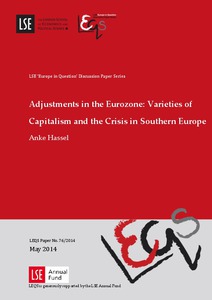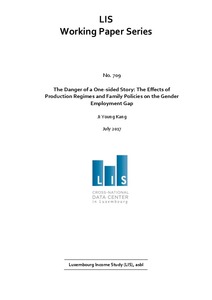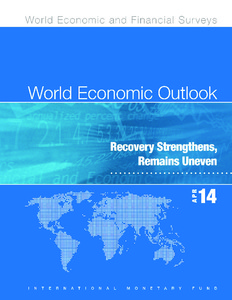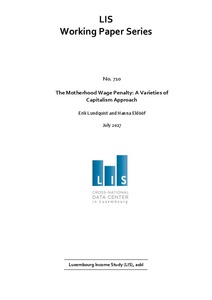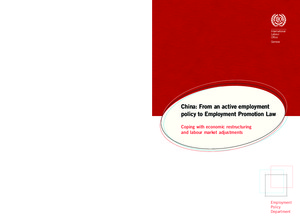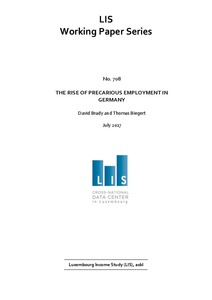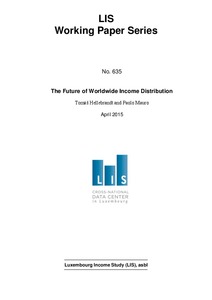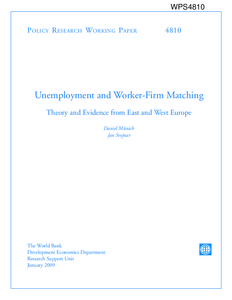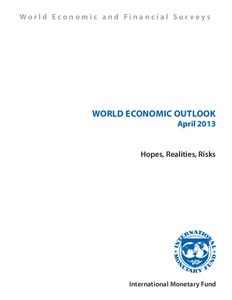-
121
-
122
-
123
-
124Published 1993Subjects:TEXT
-
125by Hassel, Anke“…The compensatory role of the state in mixed-market economies thereby undermines the effectiveness of financial bail-outs for economic growth strategies."…”
Published 2014
TEXT -
126by Kang, Ji Young“…Whereas the coordinated market economies themselves are associated with smaller gender gaps in employment participation, in the coordinated market economies leave generosity produces a higher gender employment gap than in the liberal market economies. …”
Published 2017
TEXT -
127Published 2014“…Although downside risks have diminished overall, lower-than-expected inflation poses risks for advanced economies, there is increased financial volatility in emerging market economies, and increases in the cost of capital will likely dampen investment and weigh on growth. …”
TEXT -
128Published 2013“…Chapter 4 assesses why certain emerging market economies were able to avoid the classical boom-and-bust cycle in the face of volatile capital flows during the global financial crisis."…”
TEXT -
129“…We find that when nations exhibit features in line with “coordinated market economies,” characterized by relatively stubborn employment protection, smaller degree of general inequality, more concentrated wage bargaining, and higher rate of unionization, mothers are relatively more penalized in monetary terms compared to “liberal market economies.” …”
TEXT -
130Published 2011“…The reforms, influenced by China’s accession bid to the WTO, took on the challenge of developing a socialist market economy whilst increasingly integrating it with the global economy. …”
TEXT -
131Published 2006“…After years of political instability, the countries of East and South East Europe are now well into the process of rapid transformation towards market economy structures. But the privatisation process and "learning the rules" of a modern market economy, as well as new social partnerships have had very diverse impacts on working conditions in all sectors of the economy. …”
TEXT -
132“…"Long considered the classic coordinated market economy featuring employment security and relatively little employment precarity, the German labor market has undergone profound changes in recent decades. …”
TEXT -
133Published 2016“…It treats the following areas: population; living conditions and social protection; health; education and training; the labour market; economy and finance; international trade; industry, trade and services, research and communication, transport; agriculture, forestry and fisheries; the environment and energy."…”
TEXT -
134“…"After successful transition from a socialist to market economy, the countries of Central and Eastern Europe are faced with the challenge of how to catch up with the EU15. …”
TEXT -
135“…We find that the Gini coefficient of global inequality declined from 69 in 2003 to 65 in 2013, and we project that it will decline further to 61 in 2035, largely owing to rapid economic growth in the emerging-market economies. We project major increases in the potential pool of consumers worldwide, with the largest net gains in the developing and emerging-market economies. …”
TEXT -
136by Scharpf, Fritz W.“…"At the end of the postwar period, the politically shaped configurations of normatively integrated European political economies differed greatly among "social-market" and "liberal market economies." Such differences persist even though the characteristic achievements of social market economies have since eroded under the pressures of global capitalism and of European integration. …”
Published 2014
TEXT -
137“…"The paper tests three hypotheses about the causes of unemployment in the Central-East European transition economies and in a benchmark market economy (Western part of Germany). The first hypothesis (H1) is that unemployment is caused by inefficient matching. …”
TEXT -
138Published 2013“…"Global economic prospects have improved again, but the bumpy recovery and skewed macroeconomic policy mix in advanced economies are complicating policymaking in emerging market economies. Chapter 3 examines the prospects for inflation, particularly because inflation was remarkably stable in the wake of the Great Recession and, in fact, has become less responsive to cyclical conditions. …”
TEXT -
139Published 2018“…It is structured into three parts: people — population, living conditions, health, education and training, and the labour market; economy — economy and finance, international trade, agriculture, forestry and fisheries, industry and services, and research and development and the digital society; environment — transport, energy, and the environment."…”
TEXT -
140by Barker, Roger M.“…"The corporate governance systems of continental Europe have traditionally been quite different to those of the liberal market economies (e.g. the US and the UK). Company ownership has been dominated by incumbent blockholders, with a relatively minor role for minority shareholders and institutional investors. …”
Published 2010
TEXT

